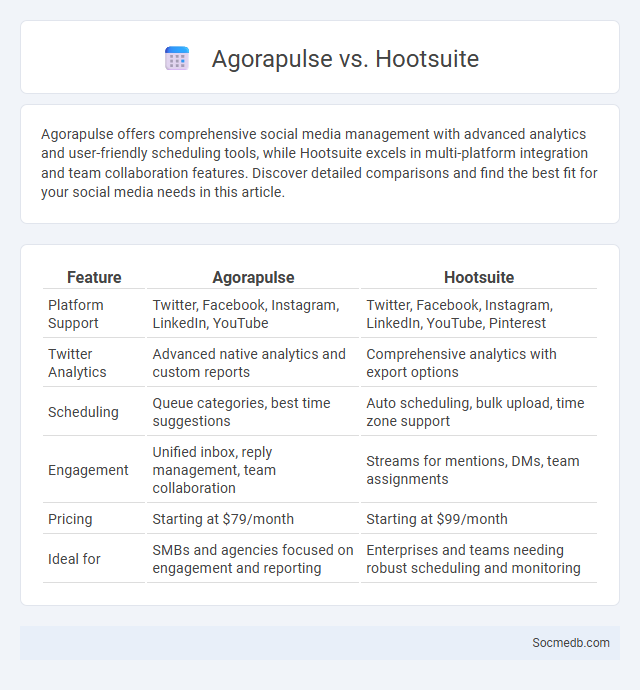
Photo illustration: Agorapulse vs Hootsuite
Agorapulse offers comprehensive social media management with advanced analytics and user-friendly scheduling tools, while Hootsuite excels in multi-platform integration and team collaboration features. Discover detailed comparisons and find the best fit for your social media needs in this article.
Table of Comparison
| Feature | Agorapulse | Hootsuite |
|---|---|---|
| Platform Support | Twitter, Facebook, Instagram, LinkedIn, YouTube | Twitter, Facebook, Instagram, LinkedIn, YouTube, Pinterest |
| Twitter Analytics | Advanced native analytics and custom reports | Comprehensive analytics with export options |
| Scheduling | Queue categories, best time suggestions | Auto scheduling, bulk upload, time zone support |
| Engagement | Unified inbox, reply management, team collaboration | Streams for mentions, DMs, team assignments |
| Pricing | Starting at $79/month | Starting at $99/month |
| Ideal for | SMBs and agencies focused on engagement and reporting | Enterprises and teams needing robust scheduling and monitoring |
Overview of Agorapulse, Hootsuite, and Social Listening
Agorapulse offers comprehensive social media management with features like scheduling, monitoring, and detailed analytics tailored for user engagement optimization. Hootsuite excels in multi-platform scheduling, content curation, and team collaboration, supporting integration with over 35 social networks for streamlined management. Social listening tools analyze brand mentions, sentiment, and trending topics across digital channels, enabling businesses to monitor reputation and gain actionable market insights.
Key Features Comparison: Agorapulse vs Hootsuite
Agorapulse excels in social media inbox management, offering unified social inboxes, advanced tagging, and sentiment analysis, while Hootsuite stands out with extensive platform integrations and robust scheduling capabilities supporting bulk uploads. Both platforms provide comprehensive analytics, but Agorapulse delivers more user-friendly report customization tailored for agency workflows. Pricing structures differ, with Agorapulse favoring smaller teams and Hootsuite catering to enterprises needing broader social network support.
Social Listening Capabilities Explained
Social listening capabilities enable businesses to monitor and analyze online conversations across social media platforms, capturing real-time data on customer sentiment, brand reputation, and market trends. Advanced tools utilize natural language processing (NLP) and machine learning algorithms to identify key themes, emerging issues, and influencer impact, providing actionable insights for marketing strategies and customer engagement. Leveraging social listening enhances competitive intelligence, crisis management, and product development by delivering a comprehensive understanding of audience preferences and behavior.
Pricing and Plans Analysis
Social media platforms offer a variety of pricing and plans tailored to different business needs, ranging from basic free tiers with limited features to advanced paid subscriptions that provide enhanced analytics and advertising tools. You can choose plans based on factors like audience size, ad budget, and required support, with most platforms offering monthly or annual billing options. Evaluating these pricing structures ensures your investment aligns with your marketing goals and maximizes return on ad spend.
User Interface and Experience
Social media platforms prioritize intuitive user interface design to enhance navigation efficiency and user satisfaction, incorporating features like personalized feeds, interactive elements, and seamless content sharing. User experience is optimized through responsive layouts, fast load times, and adaptive algorithms that tailor content to individual preferences, increasing engagement and retention. Continuous user feedback analysis drives iterative improvements, ensuring interfaces remain accessible and enjoyable across diverse devices and demographics.
Integration Options and Compatibility
Social media platforms offer diverse integration options, including APIs, webhooks, and SDKs, allowing seamless connectivity with websites, apps, and third-party tools. Compatibility spans across major operating systems like iOS, Android, and Windows, ensuring broad user accessibility and consistent functionality. Leveraging robust integration capabilities enhances user engagement, streamlines content sharing, and supports analytics-driven marketing strategies.
Reporting and Analytics Insights
Social media reporting and analytics insights provide critical data on audience engagement, content performance, and campaign effectiveness. Key metrics such as reach, impressions, click-through rates, and conversion rates enable businesses to fine-tune strategies and maximize ROI. Advanced tools like native platform analytics, Google Analytics, and AI-driven reporting software offer deep, real-time analysis for informed decision-making.
Customer Support and Community
Social media platforms enhance customer support by offering real-time interaction and personalized responses that boost satisfaction and loyalty. Your brand's active community engagement fosters trust, encourages user-generated content, and creates a supportive network for customers. Leveraging social media analytics helps optimize support strategies and deepens connections with your target audience.
Pros and Cons: Agorapulse vs Hootsuite
Agorapulse offers comprehensive social media management with features like content scheduling, in-depth analytics, and a user-friendly dashboard that simplifies team collaboration, which can enhance your brand's online presence. However, its pricing may be higher for small businesses and lacks some advanced integrations found in Hootsuite. Hootsuite provides extensive platform compatibility and robust analytics, but its interface can be complex for beginners and costs may escalate with additional apps, impacting your social media budget.
Which Social Tool Fits Your Brand Strategy?
Choosing the right social tool depends on your brand strategy, target audience, and content goals. Platforms like Instagram excel for visual storytelling and lifestyle brands, while LinkedIn suits B2B companies aiming for professional networking and thought leadership. Understanding your audience's preferences helps you leverage each platform's unique features to maximize engagement and ROI.
 socmedb.com
socmedb.com